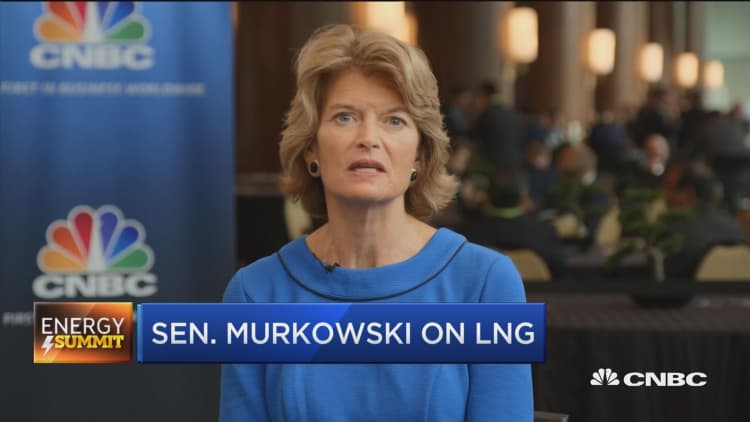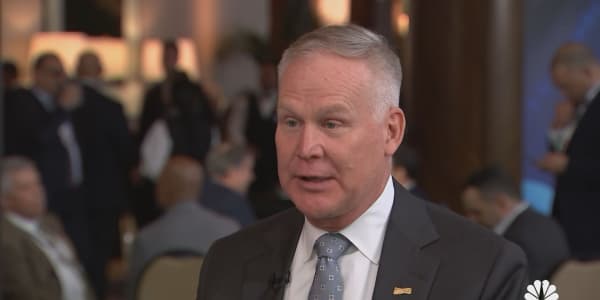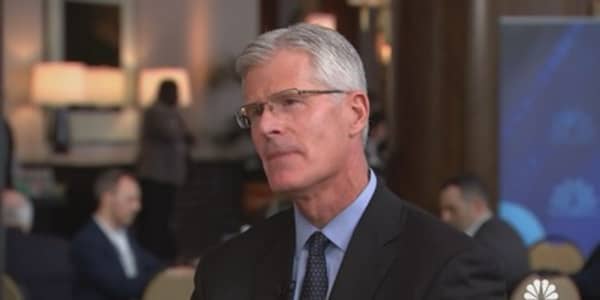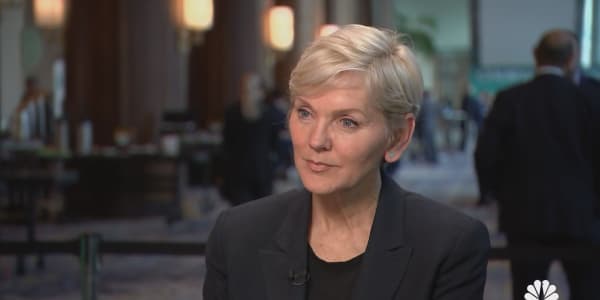One of the threads running through a major energy conference in Houston is how oil and gas companies can cut their carbon footprint and prevent the worst impacts of climate change.
Just don't ask about New York Rep. Alexandria Ocasio-Cortez's Green New Deal.
The freshman Congress member's sweeping proposal to overhaul the U.S. economy and transition to clean energy is predictably unpopular among energy executives. But even beyond the C-suite, energy thought leaders assembling at CERAWeek by IHS Markit in Houston are largely dismissing the Green New Deal as unrealistic, unworkable and politically divisive.
Instead, the climate talks at CERAWeek have largely focused on the kind of bottom-up, market-oriented solutions that Ocasio-Cortez dismisses as too conservative. Those conversations have largely overshadowed the Green New Deal, which calls for generating 100 percent of the nation's electric power from renewable sources and largely phasing oil out of the transportation sector in just 10 years.
"I think one of the reasons why you're not hearing a lot about it is because it's so unrealistic," said Mike Sommers, president of the American Petroleum Institute, the industry's biggest trade group.
"When talking about the Green New Deal, I think for most of our members, yes, they take it seriously from a public relations perspective, but you look at what it actually means, and more than anything, it's a plan to have a plan right now."
Yet the oil and gas industry is not the only part of the energy world casting doubt on the Green New Deal in Houston this week.
Beyond 'magical thinking'
Former Energy Department officials Ernest Moniz and Andy Karsner penned an op-ed for CNBC on Monday arguing for a "Green Real Deal." They warned that the "magical thinking" inherent in both climate change denial and "demonstrably impractical, short-term, feel-good solutions" threaten to derail climate progress.
They argue for low-carbon solutions that Ocasio-Cortez dismisses or marginalizes, like pairing natural gas-fired power with wind and solar farms, deploying advanced nuclear reactors and advancing technology to capture and store carbon emissions.
The biggest problem with the Green New Deal is that it puts Washington D.C. is at the center of greening the economy, said Karsner, the assistant secretary for energy efficiency and renewable energy under George W. Bush. In his view, that sort of top-down approach threatens to dilute the momentum that's already under way in pockets of the U.S., where people are creating solutions that address the specific ways climate change affects them.
"I would say Washington is an indispensable player, but it's not the main player," said Karsner, now a managing director at Emerson Collective. "This is going to come from an enormity of innovation across all of our different bubbles of the economy, whether that's in the natural resource sector based here in Houston, or the mercantile trade in Chicago, or the finance sector in New York, or the innovation epicenter of Silicon Valley."
Unlike Ocasio-Cortez, Karsner believes the market is best suited to direct the trillions of dollars in capital necessary to transition to a clean energy future. The federal government can catalyze that investment by creating a national strategy that induces the market to respond to the challenge of climate change, he said. That strategy must be pragmatic, durable and cross party lines.
Moniz, who served as Barack Obama's second Energy Secretary, says he appreciates the attention the Green New Deal has brought to climate change. But if U.S. leaders don't get better at forging political coalitions to move the ball forward on climate goals, the U.S. is not going to achieve them, he said during a panel discussion at CERAWeek.
"That means, in my view, putting forward pragmatic, practical solutions that fold all of these factors together," he said. "Some would argue that, well, that won't get us there as fast as we need to go. I would argue that that would get us there as fast as we can go."

Democrats and Republicans appear headed for a showdown over the plan.
Senate Majority Leader Mitch McConnell intends to hold a vote on Ocasio-Cortez's Green New Deal resolution to highlight divisions among Democrats on the issue. Meanwhile Minority Leader Chuck Schumer is putting forward a joint resolution calling for Congress to take action on climate change, which could put climate denial among some GOP lawmakers in focus.
Alaska Republican Sen. Lisa Murkowski, chair of the Senate Energy Committee, said both votes would dial up the rhetoric over climate change, but neither will advance a serious discussion on solutions.
"If I'm a person in Shishmaref, Alaska whose village is threatened by coastal erosion, I don't give a rip about the fact that I am on record as being in support or in opposition to" the Green New Deal, Murkowski said. "I want to know, so what is the plan? What is the proposal? How are we going to get there to a point where my community is not in peril?"
What Congress should be doing is compromising to create a bipartisan proposal built on initiatives that Democrats and Republicans agree on, and that will be good for the U.S. economy, she told CNBC on the sidelines of CERAWeek.
The ranking Democrat on the committee, West Virginia Sen. Joe Manchin, said it's unbelievable that McConnell's Green New Deal measure would get a vote on the Senate floor but long-stalled bipartisan energy reform cannot.
Industry highlights progress
In the absence of clear government signals, some of the oil and gas industry's biggest players sought to highlight how they're doing their part to cut down emissions and nudge Congress towards creating rules of the road.
I think one of the reasons why you're not hearing a lot about it [Green New Deal] is because it's so unrealistic.Mike SommersPresident, American Petroleum Institute
Vicki Hollub, CEO of Occidental Petroleum, highlighted her company's efforts to capture carbon emissions and use them for enhanced oil recovery and to generate electricity with new technologies. The company successfully lobbied with labor, environmental and industry groups to increase and extend tax credits for the carbon capture and storage technology.
Mark Little, chief operating officer at Canadian oil sands producer Suncor, said his company is part of a group of 10 firms that are now sharing environmental technology that can help to reduce greenhouse gas emissions. That is saving companies tens millions of dollars and years of time trying to replicate their rivals' advances, he said.
"Part of the challenge is, how do we collaborate differently? How do we work with people we haven't worked with before, trying to accelerate the pace so that we can deal with this challenge head on?" he said.
Executives from large European energy firms like Royal Dutch Shell, Total and Equinor also laid out how they are diversifying their portfolio away from oil and gas and greening their operations. The approaches include expanding into renewable energy, acquiring battery storage companies and piloting hydrogen energy programs.
Yet, the head of the International Energy Industry on Monday said the oil industry may be taking the issue of tackling its carbon footprint too lightly. IEA Executive Director Fatih Birol said large, diversified companies are typically allocating just a fraction of their spending to developing new clean energy technologies.
Birol urged energy giants to do a better job of broadening their portfolios to include low-carbon technology, while also improving their operations by preventing methane leaks, advancing carbon capture and storage technology and powering drilling operations with renewable energy.





